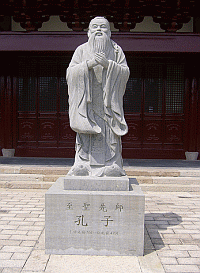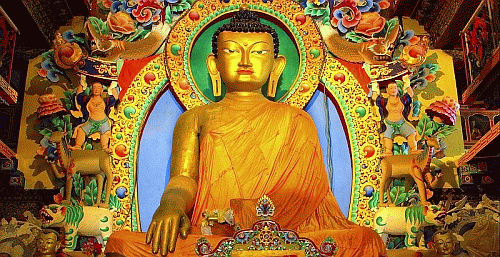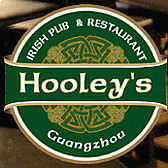|
|
| Buddhism |
Confucius - A Short
Historical Introduction
Born during The Spring and Autumn Period of the Zhou
Empire, (traditionally September 28, 551 BC –
479 BC), Confucius was a Chinese thinker and social
philosopher, whose teachings and philosophy have deeply
influenced Chinese, Korean, Japanese, Taiwanese and
Vietnamese thought and life.
His philosophy emphasized personal and governmental
morality, correctness of social relationships, justice
and sincerity. These values gained prominence in China
over other doctrines, such as Legalism and Taoism
during the Han Dynasty (206 BC – 220 AD). Confucius'
thoughts have been developed into a system of philosophy
known as Confucianism. It was introduced to Europe
by the Jesuit Matteo Ricci, who was the first to Latinise
the name as "Confucius."
His teachings may be found in the Analects of Confucius,
a collection of "brief aphoristic fragments",
which was compiled many years after his death. Modern
historians do not believe that any specific documents
can be said to have been written by Confucius, but for
nearly 2,000 years he was thought to be the editor or
author of all the Five Classics such as the Classic
of Rites (editor), and the Spring and Autumn Annals
(author).
Early Years
Confucius was born near the City of Qufu in the State
of Lu, which is now located in Shandong Province. He
is said to be born to a Noble Household who had fallen
on hard times. He was a Shepherd, Cowherd, Clerk, and
Bookkeeper. He married at age 19, to a local girl called
Qi Quan, who soon gave birth to their first son, Kong
Lu.
Details of his daily life remain obscure, but it is
noted that by age 53, he had risen to the position of
Justice Minister. Therefore we presume much of his daily
work was for the Lu Government. During this time he
also pursued his own teachings and doctrine, which were
adopted (In part) by the Ruling Family of Lu. Following
a gift of 80 horses and dancing girls from the Kingdom
of Wei = political shenanigans, Confucius sort an escape
from disillusionment with the Rulers indulgent behaviour,
and left service. He spent many years wandering the
Northeastern and Central Kingdoms of China (Including
Wei, Song, Chen and Cai), fostering his ideologies on
all that would listen. His teachings were very popular,
but their implementation was only sporadically supported
by local Rulers
Aged 68 and disillusioned, he returned to his home roots,
where he spent his last years teaching disciples and
transmitting the old wisdom via a set of texts called
the Five Classics. Burdened by the loss of both his
son and his favourite disciples, he died at the age
of 72 or 73
Confucius - Buddhism and Kung Fu
| Buddhism in China is usually traced back to
Confucius (551–479 BC), who is one of the
Country's most renowned philosophers. |

Statue of Confucius |
|
However, please do not confuse Confucianism
with Buddhism, they are separate ideologies (Albeit
with very much in common).
Contrarily: Confucianism can be synonymous with
Kung Fu, especially specific doctrines and disciplines |
|
| The name Confucius is actually a corruption
of Master Kong, and correctly rendered as 'Kung
fu zi'. Having spelt his name correctly you will
immediately be struck by the similarity to another
world famous Chinese art: Kung Fu. This is no
mistake, as Confucius was The Kung Fu Grand Master
that his name implies |
|
| Kung Fu has many forms and disciplines, and
the well known martial art is but one aspect of
this interesting subject. Kung Fu is also about
medicine - essentially Chinese Medicine, (Healthy
body, soul and mind); peace and harmony with body,
mind and environment; and self-discipline. It
also embodies 'The Ancient Arts' such as Calligraphy
- where wielding pen and sword are regarded as
requiring the same skills. You may not appreciate
the similarities until you witness a Master writing
Chinese characters in a bed of sand using a sword |
|
| The basic teachings of Confucianism stress the
importance of education for moral development
of the individual so that the state can be governed
by moral virtue rather than by the use of coercive
laws. It focuses on human morality and wrong action.
It is a complex system of moral, social, political,
philosophical, and quasi-religious thought that
has had tremendous influence on the culture and
history of East Asia. |
Other related topics include Daoism (Taoism = same thing,
different 'Anglicisation') meaning "path"
or "way", although in Chinese folk religion
and philosophy it has taken on more abstract meanings.
Daoist propriety and ethics emphasize the Three Jewels
of the Dao: compassion, moderation, and humility. Mohism
is best known for the concept of "impartial care"
or "universal love", whilst Legalism (A pragmatic
political philosophy that does not address higher questions
like the nature and purpose of life).
Confucianism in China
Without going into a long list of names and dates, the
short answer is that Confucianism is largely supported
by the majority of Chinese rulers - including up to
the present day
However, at times his political thought has been at
odds with subsequent Rulers. Lets examine his Mission
Statement again:
"The basic teachings of Confucianism stress the
importance of education for moral development of the
individual so that the state can be governed by moral
virtue rather than by the use of coercive laws"
Obviously this came to be at odds with specific Emperors,
who had no qualms about putting Confucians to death
- The Emperor is The Son of Heaven after all! These
tirades often included burning of books, destruction
of Monasteries, etc. Remnants would be cosseted and
revived by succeeding Emperors. Here is China!
Main Philosophy
Confucius' life works are passed down to us as embodied
in several schools of thought. These are arbitrarily:
Philosophy, Moral Codes, Ethics, Teachings, and Politics.
These are supported by his literary works and disciples
As this page is merely a simple introduction, we will
list the main attributes below. Please find further
information at Wikipedia
or similar sources
• Moral teachings emphasise self-cultivation,
emulation of moral exemplars, and the attainment of
skilled judgment rather than knowledge of rules
• Confucius demonstrated that a sage values human
beings over property
• Perhaps his most famous teaching was the Golden
Rule stated in the negative form, often called the silver
rule:
Adept Kung asked: "Is there any one word that could
guide a person throughout life?"
The Master replied: "How about 'shu' [reciprocity]:
never impose on others what you would not choose for
yourself?"
• Confucius' principles gained wide acceptance
primarily because of their basis in common Chinese tradition
and belief. He championed strong familial loyalty, ancestor
worship, respect of elders by their children (and, according
to later interpreters, of husbands by their wives),
and the family as a basis for an ideal government. He
expressed the well-known principle, "Do not do
to others what you do not want done to yourself"
(similar to the Golden Rule)
• The Confucian theory of ethics as exemplified
in Li is based on three important conceptual aspects
of life: ceremonies associated with sacrifice to ancestors
and deities of various types, social and political institutions,
and the etiquette of daily behaviour
• "What one does not wish for oneself, one
ought not to do to anyone else; what one recognises
as desirable for oneself, one ought to be willing to
grant to others." (Confucius and Confucianism,
Richard Wilhelm)
• Some well known Confucian quotes:
• "When you have faults, do not fear to abandon
them."
• " What you do not wish for yourself, do not do to
others"
• "With coarse rice to
eat, with water to drink, and my crooked arm for a pillow
- is not joy to be found therein? Riches and honours
acquired through unrighteousness are to me as the floating
clouds"
Further Reading
We look forward to taking this discourse further,
so see posts in our Forum
for the latest comments, views and information

Buddha Twang
Related Pages
• Bon Culture
• Buddhism
• Confucius - This Page
• Legalism
• Mohism
• Taoism
/ Daoism
• The
Swastika
• Buddhist
Breaks in China
• Kung
Fu Breaks in China |
|
This information is as supplied by Wikipedia, as dated
March 2009 or later, and/or other reliable sources.
Maps (Unless stated otherwise)
are provided in association with Thomas Lessman
Web: www.worldhistorymaps.info
Disclaimer:
Please check this information yourself as it may alter
without notice, and whilst we try our best to ensure
it is correct, please do not hold us responsible for
any errors - this is intended as a simple guide only |
|
| Search
this Website |
|
|
| Our
Friends |

Professional
Visa Services
Company
Formation Packages
.
|
Excellent
& Free Online Chinese Language Portal

Thousands of free print-friendly Chinese reference sheets,
tests and revision aids.
Easy Learning format &
Listen to Spoken Words |

British Foreign Office
Resource and Advice for Travellers Worldwide |

Chinese Embassy in UK
Information About China
International Relations
Visa & Consular |

UK Embassy in China
Information About UK
International Relations
Visa & Consular |

|
Excel
Education |
Languages Courses
Study Abroad
Employability
Summer Camps
Information for Teachers |
|

Excellent and relaxing base to
explore this most beautiful of regions in all China! |
Down The Road.org
How We Traded Our Ordinary Lives For a Global Bicycle Touring Adventure

See
Us in China |

Empowering Underprivileged Children
& Their Communities = Worldwide |
 |

Based in Shangri-la,
Yunnan
Province
Dedicated to Exploring Remote Areas of China
Committed to Nature Conservation and Preserving Ethnic
Cultures & Traditions
|

Based in Xi'an,
China's Premiere Travel Agency and International Travel
Community -
Committed to providing:
Best travel deals & current information for all
International Travellers |

Pearl Dragon
Vast
Online Trading and Information Resource
Link goes to Chinese Tourism and Galleries Section |
|